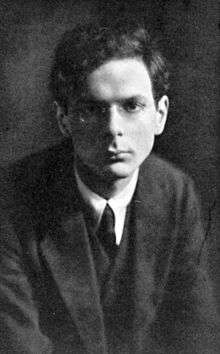Julius West

Julius West (born Julius Rappoport) (21 March 1891 – 1918) was a historian, poet, and translator.
Early life and career
Julius West was born Julius Rappoport in St. Petersburg on 21 March (9th O.S.), 1891. His father was Semon Rappoport (possibly Shloyme Zanvl Rappoport), a Russian émigré in London. The family travelled to London when Julius was only two months old. His father was Jewish but Julius was later confirmed in the Church of England and at some point changed his name to the more English sounding "West". He was educated at the Haberdashers' Aske's Boys' School in Hampstead from the age of 12.[1]
At the time of the British 1911 census, West was living at 24 Gordon Mansions, St. Pancras, London, and his occupation was shown as "librarian and clerk student [London University]". He is shown as single and working for a "political organization".[2]
West worked as a temporary clerk in the Board of Trade in London, preparing a report on the cost of living in Germany, after which he clerked at the Fabian Society. In 1913 he worked for the New Statesman for a few months.[1]
First World War
Around August 1914, West tried to obtain a commission in the British Army but was refused on the grounds that he was a Russian citizen. He argued that his parents, who were Russian, had only been visiting Russia when he was born, but it made no difference. He attempted to become a naturalised British citizen but it is unclear if he succeeded. The British authorities told him that if he wanted to fight he would have to join the Russian army who were allied to the British in the war. This he would not do as he considered himself English and his Russian was poor. He was, however, allowed to join an ambulance corps in London.[1]
Towards the end of 1914 he travelled to Petrograd, Moscow and Warsaw as a correspondent. Returning he wrote and edited Everyman. After about a year his wife died and he returned to Russia for the start of the Bolshevik regime.[1][3]
Family
West married the daughter of an English clergyman. She died around 1917.[1]
Death
West died of a complication of influenza and pneumonia in 1918.[1] His book on Chartism was completed by J.C. Squire and published in 1920.
See also
Selected publications
Non fiction
- John Stuart Mill. Fabian Society, London, 1913. (Fabian Tract No. 168)
- G. K. Chesterton: A critical study. Martin Secker, 1915.[4]
- Soldiers of the Tsar and other sketches and studies of the Russia of today. Iris Publishing Company, London, 1915.
- The fountain; or, the De Pootkins family at home and abroad. An initiation into the secrets of the literary trade. Iris Publishing, London, 1916.
- The Russian revolution and British democracy. Fabian Society, London, 1917. (Fabian Tract No. 184)
- A history of the Chartist movement. Constable, London, 1920. (Completed by J.C. Squire)
Poetry
- Atlantis, and other poems. David Nutt, London, 1913.
Translations
Chekhov:
- The three sisters
- The cherry orchard
- The proposal
- On the High Road
References
- 1 2 3 4 5 6 "Introductory memoir" by J.C. Squire, in Julius West. (1920) A history of the Chartist movement. London: Constable. pp. i-xii.
- ↑ 1911 England, Wales & Scotland Census Transcription. Find My Past. Retrieved 2 December 2015. (subscription required)
- ↑ Smith, Adrian (1996). The New Statesman: Portrait of a political weekly, 1913-1931. London: Frank Cass. p. 125. ISBN 978-0-7146-4645-9.
- ↑ Tyson, Brian (Ed.) (1996). Bernard Shaw's book reviews: Volume two 1884-1950. University Park, Penn.: Pennsylvania State University Press. p. 319. ISBN 0-271-01548-9.